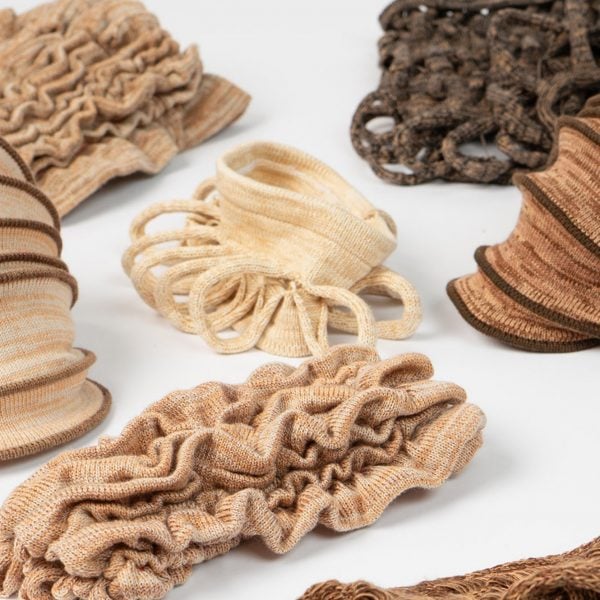Dezeen School Shows: a collection of accessories crafted from reclaimed materials that explores body image is included in this school show by Lucerne School of Art and Design.
Also included is a sustainable patchwork fabric collection intended for both garments and furniture and a textiles kit for children that aims to support inclusive education.
Institution: Lucerne University of Applied Sciences and Arts
School: Lucerne School of Design, Film and Art Lucerne
Course: Bachelor Textile Design
Tutors: Marion Becella, Franziska Born, Andrea Vogel, Lilia Glanzmann, Doris Kurzmeyer, Christa Michel, Daniela Zimmermann, Jonas Leysieffer, Mònica Gaspar and Laura Schwyter
School statement:
“Our world is changing – and textile designers are ideally equipped to face the challenges.
“With colour, pattern, functionality and sensuality as our guide, we constantly reinvent the realm of fibres, fabrics and surfaces.
“By merging materials and disciplines, we leverage our hybrid expertise to create forward-thinking ideas and aesthetic objects for various fields.
Fashion, architecture, theatre, product design, fine arts, interior architecture and research all benefit from our craftsmanship.
“We actively apply traditional skills in harmony with the digital realm, reshaping reality and making a tangible impact as grassroots experts in a transforming world.”
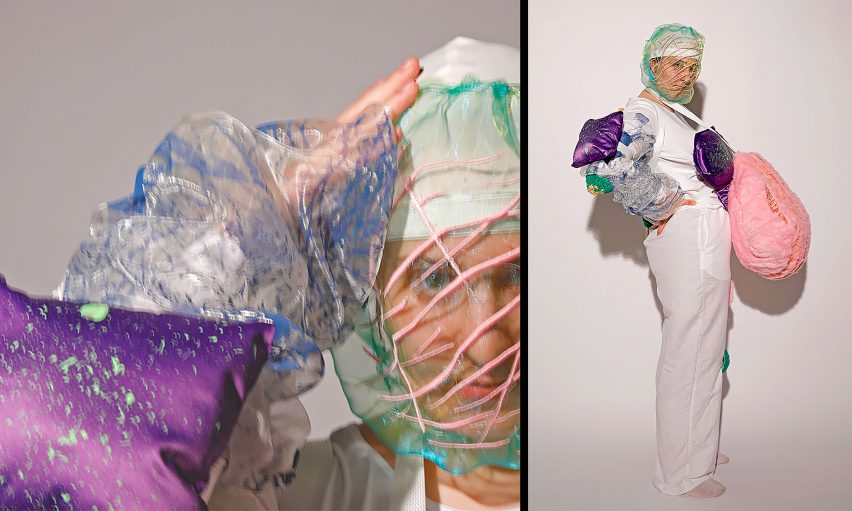
Who am I, and when, how many? by Alia Al-Khadra
“Our bodies shouldn’t be criticised for factors such as weight, disability, illness, skin colour, class or gender.
“My project – named ‘Wer bin ich und wenn, wie viele’ – addresses the meaning and challenges of body diversity.
“In an abstract form, it reflects various body characteristics: modular costume parts demonstrate how our bodies are influenced from the beginnings and then continually change due to life events.
“The project supports SDG 10 ‘reduced inequalities’.”
Student: Alia Al-Khadra
Course: Master of Arts
Tutors: Daniela Zimmermann and Jonas Leysieffer
Email: alkhadralia[at]gmail.com
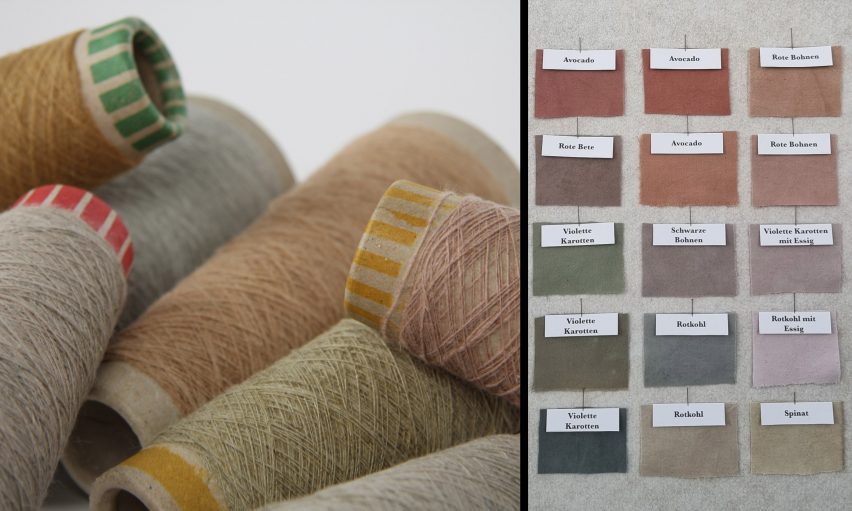
Reset Colour by Cajetana Ameriga Oechslin
“The goal of Reset Colour is to give foodstuffs a second use before they are composted.
“Inspired by SDGs 12.2 and 12.8, the work focuses on natural dyeing.
“The process involves mixing biologically degradable short linen fibres from SwissFlax with cotton to develop a better-quality yarn that can then be manufactured into textiles.
“The project intends to motivate people to treat everyday waste with more awareness and thereby produce and consume more sustainably.”
Student: Cajetana Ameriga Oechslin
Course: Bachelor Textile Design
Tutors: Marion Becella Neff and Jonas Leysieffer
Email: cajetana.ameriga.oechslin[at]gmail.com
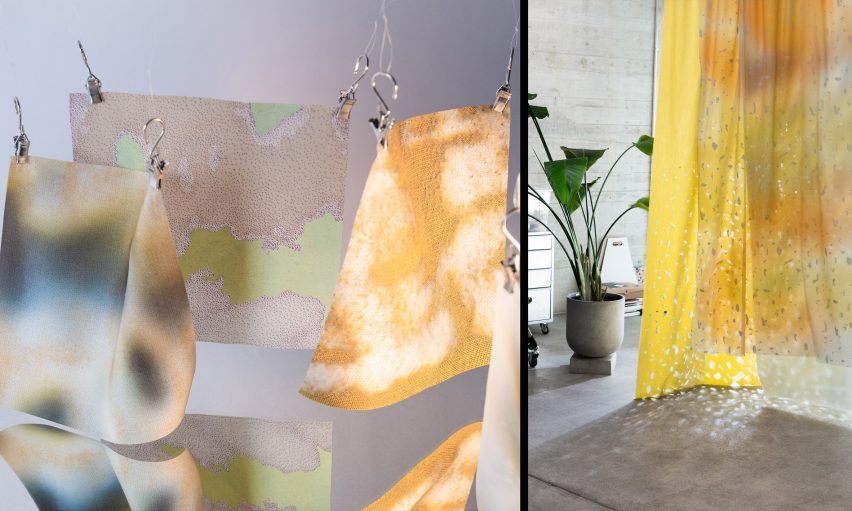
When Light Plays Along by Elena Sheila Völkle
“When Light Plays Along examines the interplay between different textile materials and processing techniques and their playful use.
“Through the conscious application of the processing techniques, my aim is to create potential – new combinations, effects and atmospheres.
“I see my work as spatially situated, whereby the tactility of the materials determines a sense of identity and promotes spatial experiences, consisting of a collection underscored by film and photography.
“The presentation, in the form of an installation with a combination of vertical hanging and horizontal placing, enables a play of light, making the items readily experienceable.
“The materials used consist of remainders, production rejects, old curtains and 100 per cent recycled polyester, thus contributing to the approaches set out in SDG 12 (responsible consumption and production).”
Student: Elena Sheila Völkle
Course: Bachelor Textile Design
Tutors: Marion Becella Neff and Jonas Leysieffer
Email: elena.voelkle[at]gmx.ch
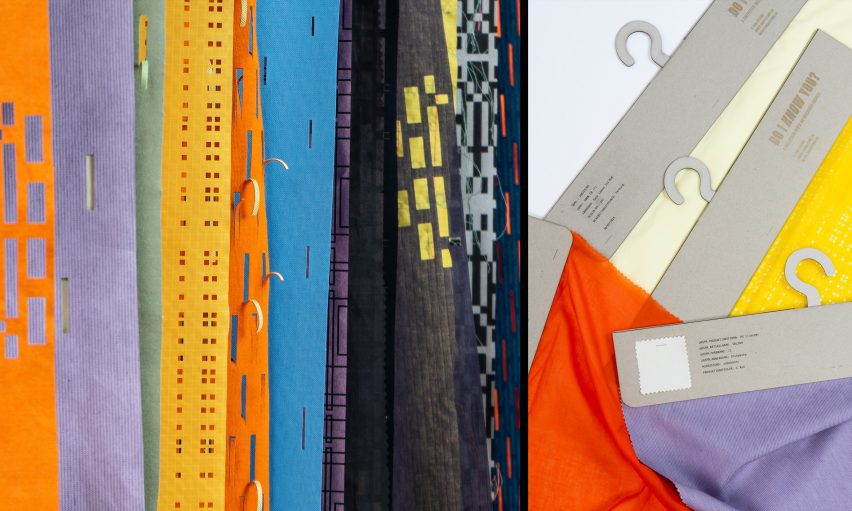
Ressourcenmeter by Jana Besimo
“In the textile industry, large quantities of high-quality fabric are rejected as unfit for production due to extremely minor defects.
“Ressourcenmeter concentrates on the reuse of these yard goods and aims to stimulate a shift in perspective – away from rejects and towards resources.
“Upgrading these materials contributes to tackling SDG 12.5, with the goal of substantially reducing the generation of waste by 2030 through recycling and reuse.
“Working with already designed fabrics as a basic material requires a different approach and the formulation of coordinated processing techniques.
“The result of this material research is a collection combined with a skillset for design approaches with existing materials and how they can be refined.”
Student: Jana Besimo
Course: Bachelor Textile Design
Tutors: Franziska Born and Jonas Leysieffer
Email: jana.besimo[at]bluewin.ch
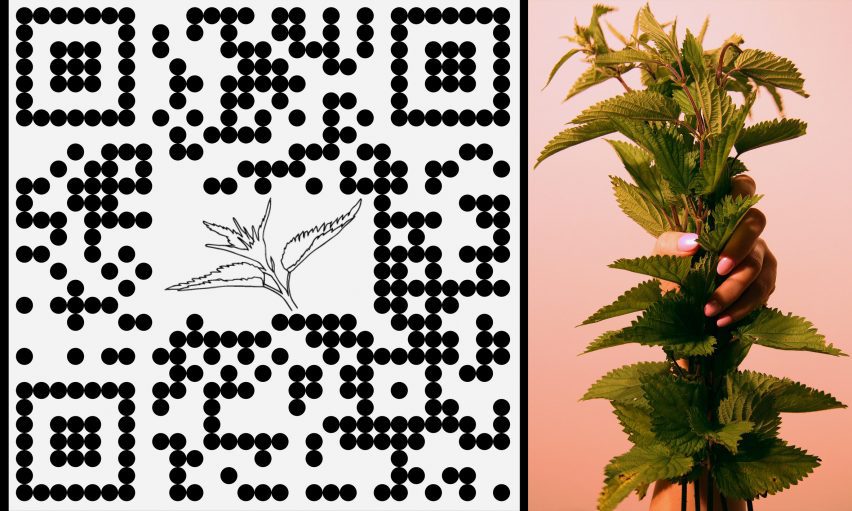
Textiles with a Sting by Julia Rutschmann
“Stinging nettles, often seen as annoying weeds, have a large hidden potential as a sustainable resource.
“Textiles with a Sting examines the versatile potential uses for nettles and demonstrates how they can be processed into fabric.
“By promoting acknowledgement amongst younger generations, the aim is to generate awareness for local raw material processing in order to reflect on one’s own purchasing habits and to contribute to environmental protection in the sense of SDG 12 (responsible production and consumption).”
Student: Julia Rutschmann
Course: Bachelor Textile Design
Tutors: Marion Becella and Jonas Leysieffer
Email: julia-rutschmann[at]outlook.com
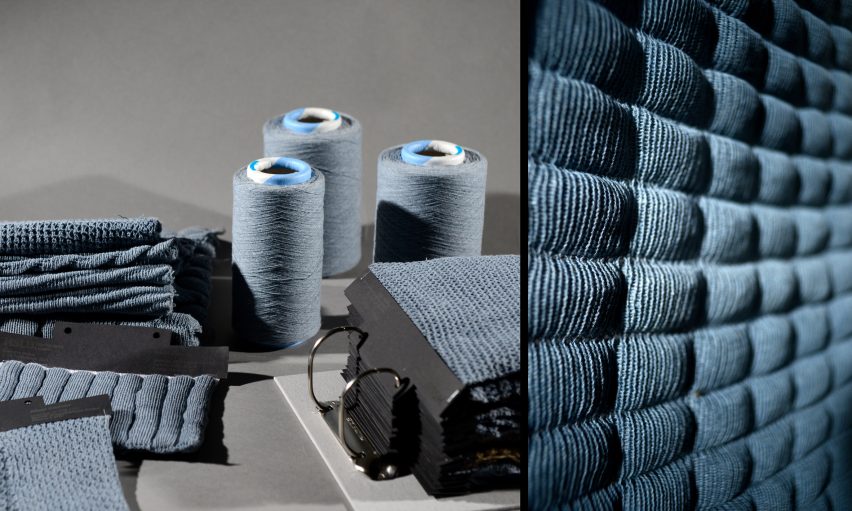
Silent Canvas An examination of acoustic textiles using biomorphic design by Kateryna Basiuk
“Silent Canvas investigates how recycled yarns function for aesthetically appealing and effectively cushioned circular acoustic absorbers.
“The collection shows the scope for improving the visual properties of such absorbers – inspired by the ultrasonic absorbing microstructures of moth wings, knitting serves as the key technique in replicating these natural structures in recycled materials.
“The project deals with SDG 12.5, the reduction of waste generation through reuse, and through partnership and knowledge exchange contributes to meeting SDG 17.
“The work is part of a project of the products and textiles research group – HSLU Design, Film and Art.”
Student: Kateryna Basiuk
Course: Bachelor Textile Design
Tutors: Christa Michel and Jonas Leysieffer
Email: catherine.basiuk[at]gmail.com
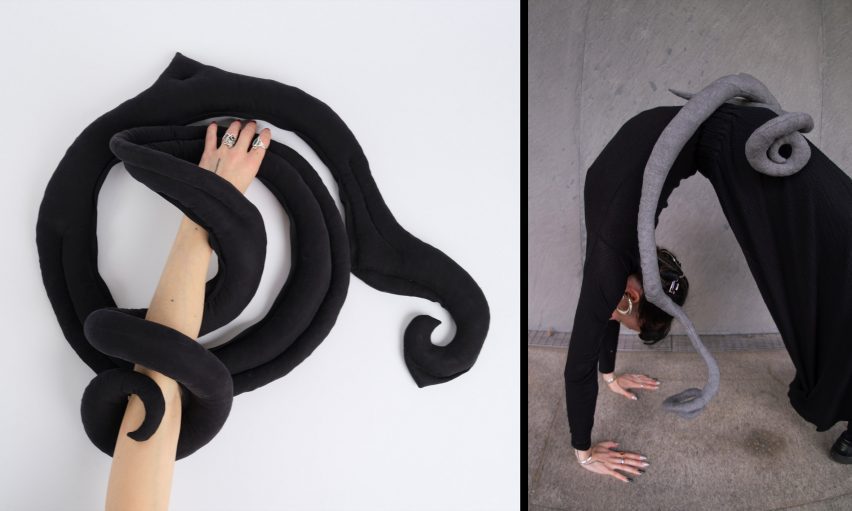
Ambiguities: textile embodiments and the bodily self by Larissa Riesen
“This project combines aims to playfully trigger unfamiliar and ambiguous bodily sensations – it examines conscious interactions between our own bodies and textiles.
“The results of the process are textile embodiments made of second-hand materials (SDG 12).
“By putting on the textile embodiments, the viewers themselves become actors and are invited to consciously confront their own bodies.”
Student: Larissa Riesen
Course: Bachelor Textile Design
Tutors: Daniela Zimmermann and Jonas Leysieffer
Email: larissa.riesen[at]bluemail.ch
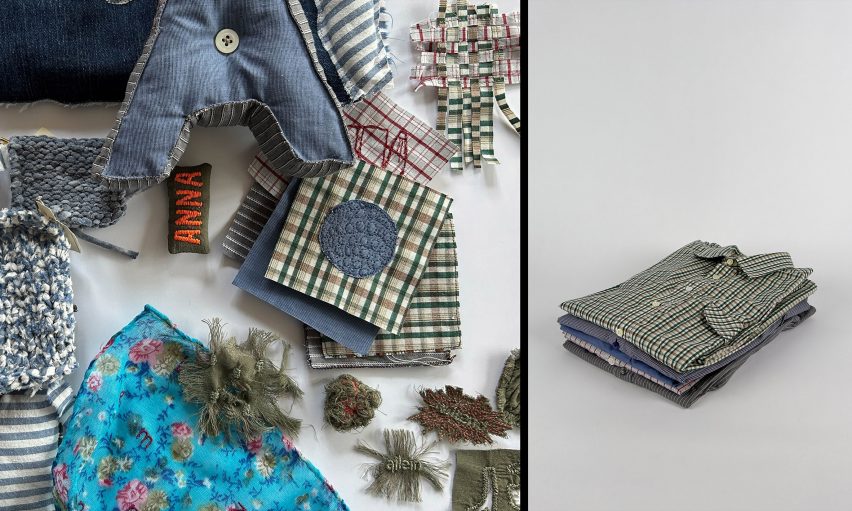
Weitertragen by Lioba Wachter
“Weitertragen demonstrates ways in which textiles from deceased people can be reused.
“Derived from fictive posthumously left behind things, a series of objects have been created as remembrances and comforts, to talk about and show grief.
“The project is a textile confrontation with mourning and the first step in providing the textiles of loved ones with a place in the everyday lives of relatives and friends.
“The experiments form the basis of ideas for future implementations in which the wishes of the mourners are integrated.
SDG 3, good health and wellbeing, is relevant to the work.
Student: Lioba Wachter
Course: Bachelor Textile Design
Tutors: Franziska Born and Jonas Leysieffer
Email: lioba.wachter[at]bluewin.ch
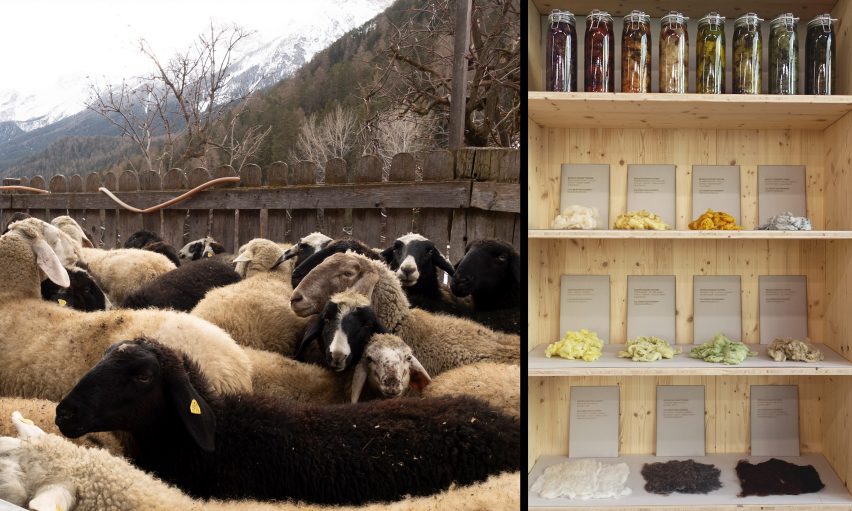
WOLLS//CH//ICHT by Livia Irina Schlup
Our understanding of nature is shaped by a culture-nature dualism that also impacts on our ways of thinking and actions as designers.
“In WOLLS//CH//ICHT, Livia Schlup treats herself and her work as part of a network of relationships.
“Her design process takes place in and together with non-human nature, including by integrating the elements – snow, rainwater, a river, the sun and other fellow beings act as co-designers.
“She also knows the flock of sheep that produces the wool she uses.
“WOLLS//CH//ICHT relates to SDG 15 (life on land) with the sub-goal to conserve mountain ecosystems (SDG 15.4).”
Student: Livia Irina Schlup
Course: Bachelor Textile Design
Tutors: Daniela Zimmermann and Jonas Leysieffer
Email: info[at]liviairina.ch
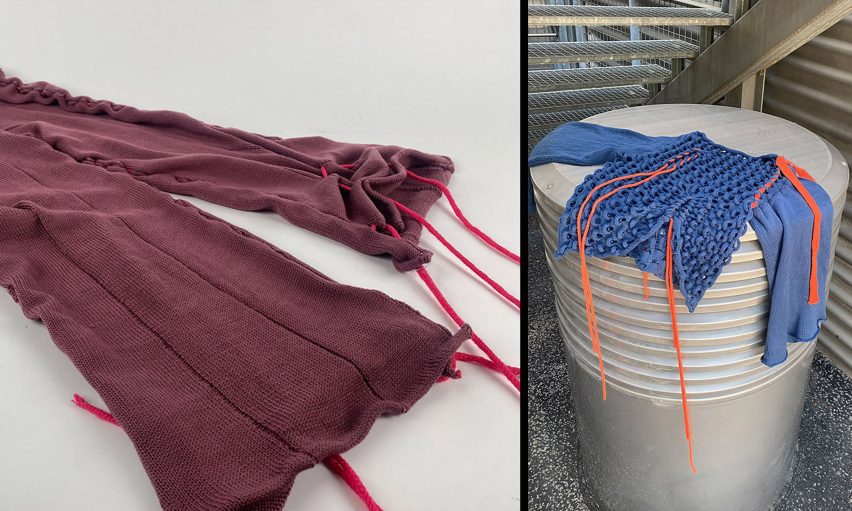
Strings Attached by Sabrina Berger
“Inspired by SDG 12 (responsible consumption and production), the project Strings Attached involves the creation of modifiable items of clothing.
“The possibility to alter them is intended to generate a deeper interaction with the clothes, which in turn leads to an emotional attachment.
“This is part of the strategy of ’emotionally durable design’ formulated by Jonathan Chapman, in which longevity and durability are achieved via an emotional relationship with the object.
“The topic is reinforced with the design motif of the metamorphosis of a butterfly, visible in the colours and structures.”
Student: Sabrina Berger
Course: Bachelor Textile Design
Tutors: Christa Michel and Jonas Leysieffer
Email: sabrina.berger[at]outlook.com
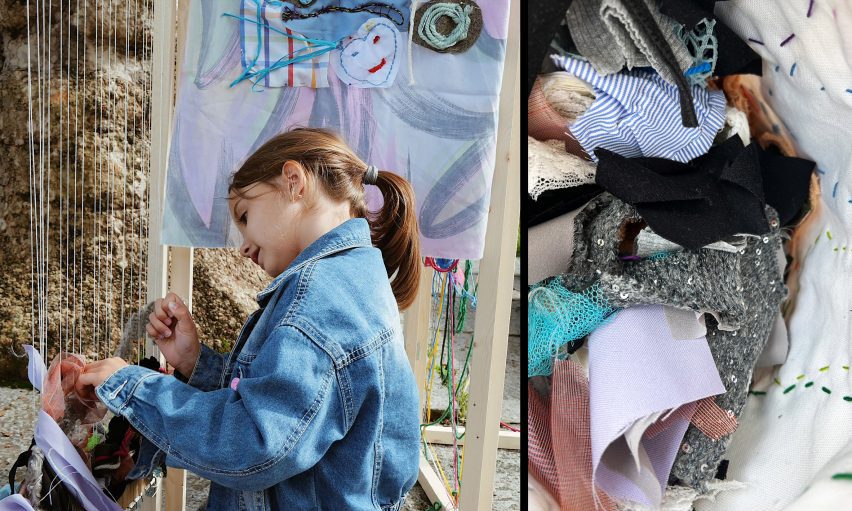
Textile kit 4 kids by Taira Lamberti
“The project Textile kit 4 kids focuses on promoting manual and fine motor skills amongst primary school children.
“It consists of a wooden structure on which children can practice techniques such as weaving, stitching, braiding and freestyle creative crafting.
These textile techniques play an integral part in pedagogical knowledge and the approach factors in aspects of SDG 4, in the sense of ensuring inclusive and equitable quality education and the promotion of lifelong learning opportunities for all.
Student: Taira Lamberti
Course: Bachelor Textile Design
Tutors: Franziska Born and Jonas Leysieffer
Email: taira.lamberti[at]gmail.com
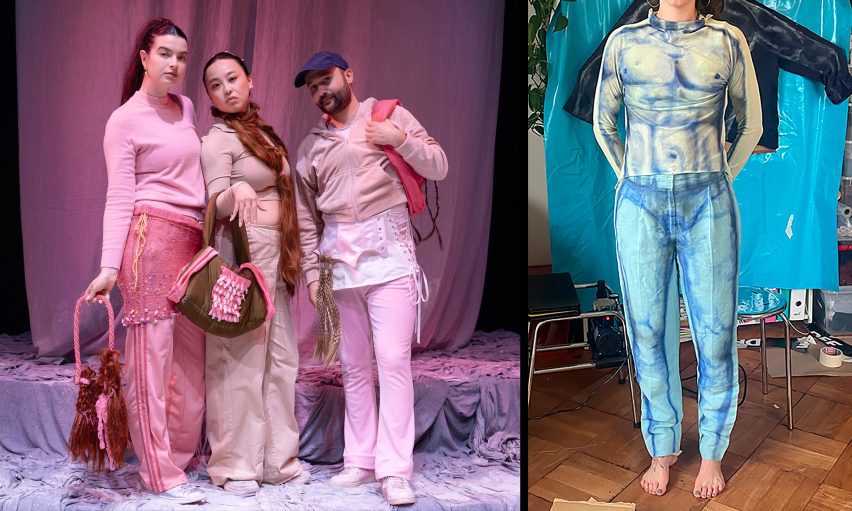
Im Spiegelsaal – material-driven costume design by Valerie Meta Ehrenbold
“Theatre and comics have a lot in common – both media use not only text but also visual elements in order to tell stories and develop characters.
“For the comic production of Im Spiegelsaal (In the Hall of Mirrors), based on Liv Strömquist, at the ZHdK, costumes were created made entirely of second-hand, leftover and waste material.
“The design process demonstrates how creative reuse works in costume design and contributes to SDG 12.5 with the goal of significantly reducing waste generation.”
Student: Valerie Meta Ehrenbold
Course: Bachelor Textile Design
Tutors: Franziska Born and Jonas Leysieffer
Email: info[at]valeriemeta.ch
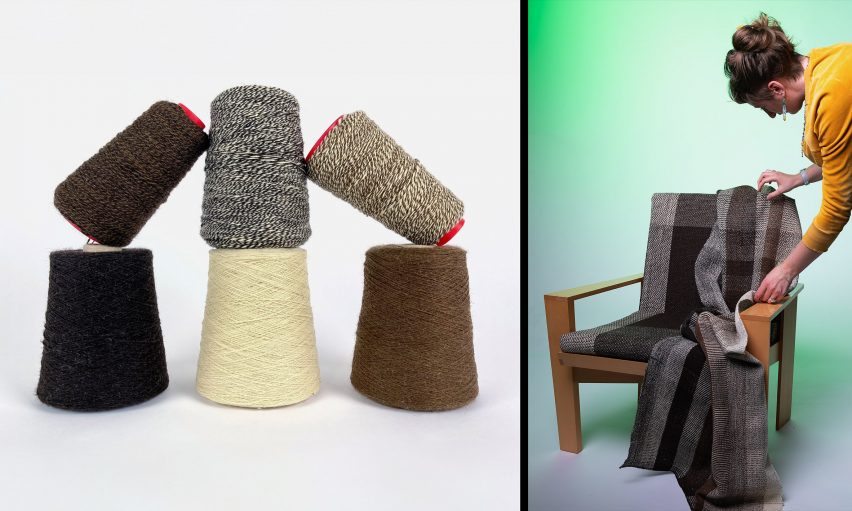
Raw, Rare and Resilient by Zora Aziza Weidkuhn
“Swiss wool embodies considerable potential for interior textiles.
“In order to explore this scope, I process local, un-dyed wool from various different breeds of sheep and then design with them from the yarn to the fabric – the product is a newly upholstered easy chair.
“For various reasons, the danger is that high-quality processing vanishes.
“This is where my metier as a designer is called for, and the point where I want to intervene.
“I demonstrate a series of attractive solutions to re-establish the material’s value, thereby contributing to SDG 12.2 for the sustainable management and efficient use of natural resources.”
Student: Zora Aziza Weidkuhn
Course: Bachelor Textile Design
Tutors: Marion Becella and Jonas Leysieffer
Email: zora.weidkuhn[at]gmail.com
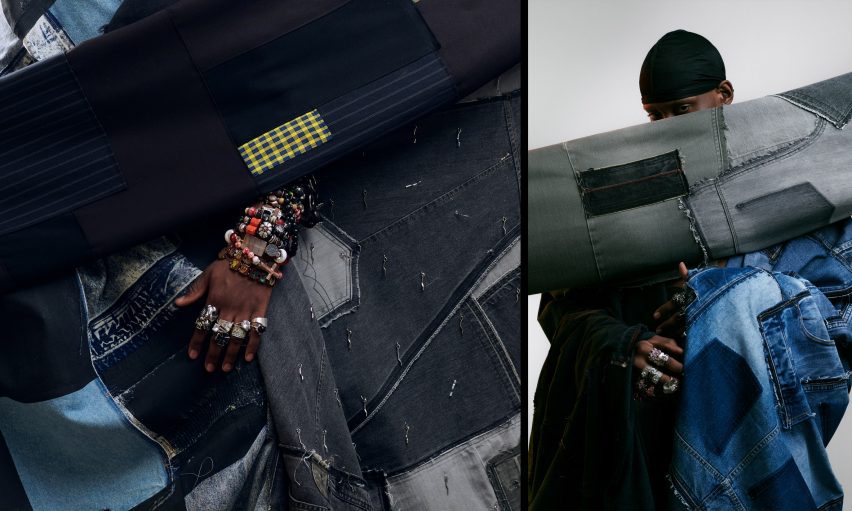
Obroni Wa Wu, Dead White Man’s Clothing by Manutcher Milani
“In this body of work, Milani, who lives and works in Zurich, tackles and proposes a solution to a rapidly growing global issue: the secondhand clothing waste crisis, initiated by fast fashion.
“Garments, collected in containers and charities from the Global North, are predominantly exported to the Global South, including Milani’s homeland, Ghana.
“The patchworked pieces were primarily sourced in Accra and Zurich, to then be carefully washed, deconstructed and reassembled by hand into a textile surface.
“Milani has chosen two-meter sections as prototypes for a later production on rolls with the aims to inspire designers and tailors to create new sustainable garments or furniture from his patchwork.
“The project addresses SDG 12 responsible consumption and production.”
Student: Manutcher Milani
Course: Bachelor Textile Design
Tutors: Daniela Zimmermann and Jonas Leysieffer
Email: manutcher[at]bluewin.ch
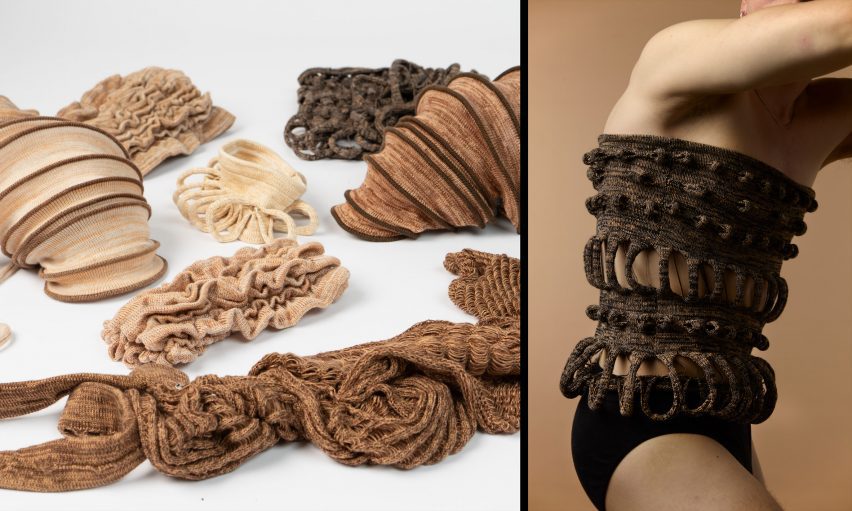
Deshape wear ‘body-modifying knits’ by Lisa Schöpflin
This work examines and questions body extensions and body modelling, existing expectations about ideals of beauty, and normed bodies.
“In this project, products such as shapewear or corsets that often serve to customise the body to standardised ideals are deconstructed and reinterpreted.
“Through individually knitted accessories, current, western trends of body images are reflected upon whilst playfully breaking open how they are perceived – the accessories allow scope for the individual shaping of body forms, and the material used was collected from off-cuts, hand-me-downs and a stock of remainders.
“The work is based on feminist principles and addresses both gender and visual appearances in current pop culture.
“In the process, the project factors in SDG 12 (responsible consumption and production) and SDG 5 (gender equality/ FINTA*).”
Student: Lisa Schöpflin
Course: Bachelor Textile Design
Tutors: Christa Michel and Jonas Leysieffer
Email: lisa.schoepflin[at]bluewin.ch
Partnership content
This school show is a partnership between Dezeen and Lucerne School of Art and Design. Find out more about Dezeen partnership content here.

